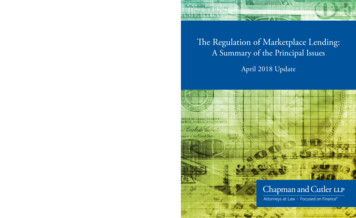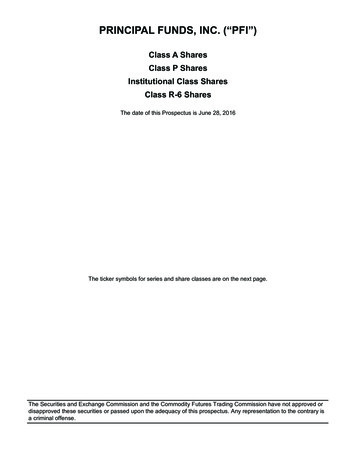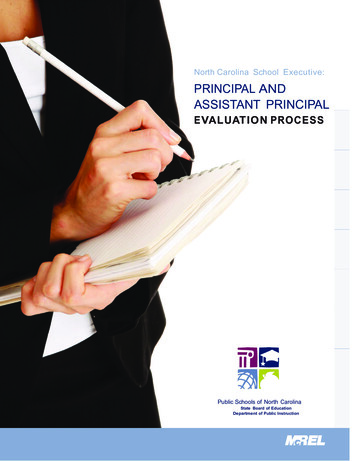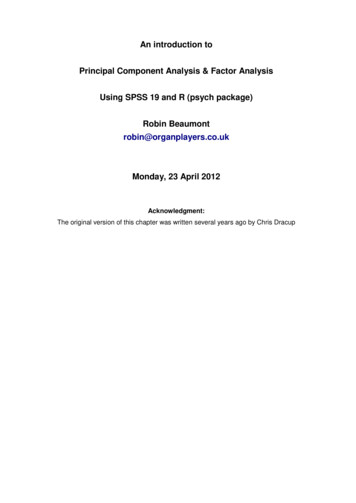
Transcription
Charlotte201 South College Street, Suite 1600Charlotte, NC 28244-0009980.495.7400Chicago111 West Monroe StreetChicago, IL 60603-4080312.845.3000New York1270 Avenue of the Americas, 30th FloorSalt Lake City215 South State Street, Suite 800San Francisco595 Market Street, 26th FloorSan Francisco, CA 94105-2839415.541.0500Washington, DC1717 Rhode Island Avenue NW, Suite 800Salt Lake City, UT 84111-2339801.533.0066chapman.comNew York, NY 10020-1708212.655.6000Washington, DC 20036-3026202.478.6444The Regulation of Marketplace Lending:A Summary of the Principal IssuesApril 2018 Update
THE REGULATION OFMARKETPLACE LENDING:A Summary of the Principal IssuesApril 2018 Update
Peter ManbeckMarc Franson*This document has been prepared by Chapman and Cutler LLP attorneys for information purposes only. It isgeneral in nature and based on authorities that are subject to change. It is not intended as legal advice.Accordingly, readers should consult with, and seek the advice of, their own counsel with respect to any individualsituation that involves the material contained in this document, the application of such material to their specificcircumstances, or any questions relating to their own affairs that may be raised by such material. The publicationand receipt of this document do not constitute legal advice or establish an attorney-client relationship with anyperson. Attorney advertising material. 2018 Chapman and Cutler LLP*The authors acknowledge with thanks the contributions of other Chapman and Cutler attorneys to the preparation of thissurvey, including David Batty, Colman Burke, Walt Draney, Sara Ghadiri and Gregory Xethalis, with a special thanks toour Research Services team and Sarah Andeen.
Table of ContentsSECTIONPAGEPreface . iRecent Developments.1I.II.III.IV.V.VI.“True Lender” Litigation .1A.Colorado Regulator Takes on Marketplace Lenders .1B.CashCall—California Decision. .3C.Small Business Marketplace Lender Sued in Massachusetts. .4D.Update on Pennsylvania Think Finance Litigation—Investors Sued .4E.Recent Action in North Carolina .5Madden Continued .6A.Illinois Court Cites Madden .6B.Madden “Fix” Legislation .6Federal Regulatory Developments Affecting Marketplace Lending .7A.Consumer Financial Protection Bureau .7B.Office of the Comptroller of the Currency . 10C.Federal Deposit Insurance Corporation . 10D.Federal Reserve. 13E.Department of the Treasury—Forthcoming Report on FinTech . 13F.U.S. Congress FinTech Hearing . 13G.Basel Committee on Banking Supervision . 14H.March 2018 GAO Study Released on FinTech . 14State Regulatory Developments Affecting Marketplace Lending . 15A.State Regulators Promote Innovation. 15B.State Regulator Enforcement Actions, Information Gathering. 16Other Litigation Affecting Marketplace Lending . 18A.Fair Lending—Loan Purchasers . 18B.Debt Buyer is Not a Debt Collector . 18C.Spokeo, Standing and Actual Harm. 19D.Telephone Consumer Protection Act . 20E.ADA and Website Accessibility for the Disabled . 21Blockchain . 22Background. 25Regulatory Issues . 29I.Securities Laws . 29A.Securities Act . 29B.The Private Placement Rules. 33
II.III.IV.V.VI.VII.C.Regulation A . 36D.Blue Sky Laws. 38E.Secondary Trading . 40F.Securities Exchange Act . 44G.Investment Company Act . 45H.Investment Advisers Act. 48I.Risk Retention Requirements . 50J.Securitization . 53K.Closed-End Investment Companies. 60Lending Laws, Licensing and Related Litigation . 64A.Usury Laws . 65B.Issues Related to the Funding Bank Structure. 70C.State Licensing Requirements. 77Regulatory Matters. 81A.OCC Proposes Special-Purpose Charter for Fintech Firms . 81B.Other Regulatory Promulgations . 83Consumer Protection Laws. 88A.Truth in Lending Act. 89B.FTC Act, UDAP Laws, and the CFPB’s UDAAP Authority . 90C.Fair Lending and Related Laws. 91D.Debt Collection Practices . 95E.Privacy Laws. 96F.Electronic Commerce Laws . 97G.Other Relevant Laws . 100H.State Developments. 105Bankruptcy Considerations . 107A.Addressing Insolvency Risk . 107B.Security Interests in Electronic Collateral . 111C.Transferable Records. 115Tax Considerations. 118A.Tax Treatment of Platform Notes . 118B.Direct Investments in Marketplace Loans by Non-U.S. Persons. 120Crowdfunding Rules. 121More Information . 125Annex A: About Chapman
The Regulation of Marketplace Lending: A Summary of the Principal Issues (April 2018 Update)PrefaceWe are pleased to offer once again our annual survey of the principal regulatory and securities issuesapplicable to marketplace lending. As in past surveys, we have no shortage of topics to discuss thisyear as the past 12 months have seen both significant court cases and shifting regulatory initiatives dueto political changes. We discuss the most important developments of the past year in the “RecentDevelopments” section that immediately follows this Preface. The remainder of this white paper thendescribes in greater detail the status of marketplace lenders under existing securities, consumerprotection, and other applicable laws.At the outset, it may be helpful for us to briefly discuss the scope of this paper and some of theterminology we use. There is no single or universally accepted definition of “marketplace lending.”In general, though, marketplace lenders can be viewed as companies engaged in an Internet-basedlending business (other than payday lending) which are not banks or savings associations or otherwiseregulated as financial institutions. They may offer a wide variety of financial products, includingstudent loans, small business loans, and real estate loans, in addition to the unsecured installmentconsumer loans on which the industry initially focused. However, “marketplace lenders” may or maynot actually be lenders. This term is a generic term to identify participants in marketing, originating,selling, and servicing loans. They also may fund their loans through a variety of means, includingequity capital, commercial lines of credit, sales of whole loans to institutional investors, securitizations,and/or pass-through note programs. In this paper, we focus on the consumer lenders since they arethe most heavily regulated and have the highest loan volumes. However, much of the discussionherein—outside of matters pertaining directly to consumer lending regulation—will also apply to nonconsumer lenders.The marketplace lending industry is best known to the public through the pass-through notesprograms operated by LendingClub Corporation and Prosper Marketplace. These so-called peer-topeer (or “P2P”) programs enable retail investors to purchase nonrecourse notes representing fractionalinterests in specific underlying consumer loans. It was once widely expected that P2P programs wouldbecome common. In fact, however, most marketplace lenders do not operate such programs on eithera public or private basis, in part because of the availability of funding from other sources, but also inpart because of the costs and difficulties of securities law compliance. As marketplace lenders whooperate P2P programs therefore face some compliance issues that may not apply to those who don’t,herein we refer to lenders who operate such programs as “Operators” and use the term “marketplacelender” or “lender” to refer to marketplace lenders generally. In some instances, we refer tomarketplace lenders as “platforms,” since by definition such lenders provide their services throughInternet-based platforms.Some marketplace lenders solicit borrowers to take loans that are actually made and originated byFDIC-insured financial institutions. For these types of programs, we refer to the bank that serves as–i–
The Regulation of Marketplace Lending: A Summary of the Principal Issues (April 2018 Update)the originating lender as the “Funding Bank.” The Funding Bank structure (sometimes called the bankpartnership model) has generated legal challenges, as discussed in this white paper, particularly wherethe marketplace lender both solicits and then purchases and services the loans. Other marketplacelenders obtain state licenses in order to make loans directly to borrowers under state laws.Of course, regardless of its source of funding, any prospective operator of an Internet lending platformmust be careful to plan and operate its business in compliance with applicable laws and regulations.Regulatory costs have proven to be a significant barrier to entry in this industry; such costs will remaina significant expense for those platforms that commence operations, and any failure by a platformoperator to comply with applicable laws and regulations can result in civil or criminal penalties,litigation expense, adverse publicity, or, in an extreme situation, the termination of its business. In thisregard, we hope that our survey will help lenders and other market participants understand the keyregulatory issues facing them.As a final word, we must caution that this survey is intended only to identify the principal regulationsthat apply to Internet-based lending and does not provide detailed guidance on the steps required tocomply with any particular law or as to the laws that may apply to any particular marketplace lenderor program.– ii –
The Regulation of Marketplace Lending: A Summary of the Principal Issues (April 2018 Update)Recent DevelopmentsIn this section, we discuss the most significant litigation and federal and state regulatory developmentsaffecting marketplace lending that have been filed, decided or announced in the past 12 months.I.“TRUE LENDER” LITIGATIONSo-called “true lender” litigation remains one of the most significant risks facing the marketplacelending industry. These are cases involving a claim by a borrower or regulator that the “true lender”of a loan funded by a Funding Bank for a marketplace lender is the marketplace lender rather than theFunding Bank.1 Often such litigation involves asking the court to look past the form of the loantransactions to their substance in order to ascertain which party, the Funding Bank or the marketplacelender, holds the predominant economic interest in the loans. The aim of true lender claims is to subjectthe marketplace lender to federal and state regulation as a non-bank lender, enabling the claimant topursue actions based on failure to comply with state lender licensing or usury laws.2 Important recentdevelopments in this area include the following:A.Colorado Regulator Takes on Marketplace Lenders. The most significant recent truelender challenge has come from a state regulator. The Colorado Attorney General also serves asAdministrator of the state’s Uniform Consumer Credit Code (the “UCCC”), the law which governsextensions of consumer credit to Colorado residents.3 Colorado’s version of the UCCC contains anextraterritoriality provision which purports to apply the UCCC to any consumer credit transactionwith a Colorado resident, even those made by out-of-state lenders, and prohibits the parties fromchoosing any law to govern the transaction other than Colorado law. Like other state consumerprotection laws, the UCCC also limits the interest rates and fees that can be charged in consumer credittransactions.1Many of the true lender cases decided to date have involved payday lenders rather than marketplace lenders. See “IssuesRelated to the Funding Bank Structure” below for a discussion of these cases and other earlier proceedings.2The doctrine of federal preemption entitles national banks and FDIC-insured state banks to export the rates and fees of thestate in which the bank is located to borrowers in other states and to preempt inconsistent state laws in those otherstates. See 12 USC § 85 for national banks and 12 USC § 1831d for state banks. A marketplace lender and its Funding Bankmay rely upon federal preemption to extend loans at a higher interest rate than applicable state law would otherwise allowand to exempt the marketplace lender from state lending license requirements. If, however, a marketplace lender isdetermined to be the “true lender” of a loan funded by a Funding Bank, such loan will not qualify for federal preemptionand the marketplace lender will be required to comply with all applicable state usury and licensing laws, typically thoseof the state where the borrower resides.3A number of other states have also enacted versions of the UCCC, including Idaho, Indiana, Iowa, Kansas, Maine,Oklahoma, South Carolina, Utah, Wisconsin, and Wyoming.–1–
The Regulation of Marketplace Lending: A Summary of the Principal Issues (April 2018 Update)In early 2017, the Administrator brought legal actions against two marketplace lenders that are licensedunder the UCCC.4 Although the loans originated by these marketplace lenders were made by FDICinsured state-chartered banks, the Administrator’s allegations ignored that fact and did not name theFunding Banks in the actions in a deliberate attempt to avoid motions for removal to federal courtbased on federal preemption principles. The Administrator claimed that the marketplace lenders madeloans to Colorado residents in excess of the state’s interest rate limitation, charged fees in excess ofthose allowed by the UCCC, and used a governing law provision other than Colorado in their loanagreements.5 At the heart of the Administrator’s claims were allegations that the marketplace lenderswere the true lenders on the loans to Colorado residents because the marketplace lenders held thepredominant economic interest in the loans.6Worth Noting: Because this is an action brought by a state regulator on a true lendertheory, the outcome could affect the Funding Bank model used by many marketplacelenders or spawn litigation of a similar nature in other jurisdictions, particularly inthose states which have adopted a version of the UCCC.7Soon after the Administrator filed suit, the marketplace lenders removed the cases to federal court,claiming that the actions were completely preempted by federal law, specifically the Federal DepositInsurance Act, because the loans at issue were made by FDIC-insured banks. Separately, the twoFunding Banks involved filed declaratory judgment actions in federal court asking the court to declarethat the loans were validly made by a federally-insured depository institution and, therefore, that therates and fees on the loans are subject to federal preemption applicable to the Funding Banks, and notsubject to state law. The Funding Banks are also seeking to enjoin the Administrator from taking4The Colorado UCCC requires licensing in order to take assignment of and service consumer loans, thus a license is requiredfor many marketplace lenders including those targeted in this action, Avant and Marlette Funding d/b/a/ Best Egg. Beinglicensed gave the Colorado regulator the ability to examine and exercise jurisdiction over these marketplace lenders.5These allegations are problematic because any non-bank assignee of a bank loan that failed to comply with Colorado lawwould be subject to suit under the Administrator’s theory.6The Administrator alleged that the marketplace lenders pay implementation fees to start the programs, pay the FundingBanks’ legal fees, bear the costs of marketing the program and evaluating loan applications, are responsible for ensuringcompliance with applicable laws and assume responsibility for the servicing and administration of the loans even beforethey have purchased the loans from the Funding Banks. The Administrator also alleged that the marketplace lendersassume all risk of default and indemnify the Funding Banks for claims arising from the lending programs.7Since multiple other states have enacted a form of the UCCC, the decisions ultimately rendered in the Colorado cases willbe of interest to regulators and potential litigants in multiple jurisdictions. If the Administrator prevails, state regulatorsand private litigants in other UCCC jurisdictions (and possibly elsewhere) might consider whether they have grounds topursue true lender claims against marketplace lenders that utilize Funding Banks. In this regard, we note that legislationwas introduced in Congress (H.R. 4439-the Modernizing Credit Opportunities Act) in November 2017 that would addressthe true lender issue and provide market certainty by amending various federal statutes to provide that (1) the role of abank as lender is not affected by any contractual arrangement between the bank and a third-party service provider, and (2)federal preemption of state usury laws applies to any loan made by a bank where the bank is the party to whom the originalloan is owed. Thus, the bank would be considered the true lender of the loan. The bill has been assigned to a Housecommittee for consideration where it remains at the time of this writing.–2–
The Regulation of Marketplace Lending: A Summary of the Principal Issues (April 2018 Update)further action against the marketplace lenders.8 In response, the Administrator filed motions to dismissboth of the Funding Bank-initiated actions, which motions have been fully briefed and are nowawaiting decisions.In March 2018, the federal court hearing the actions against the marketplace lenders determined that ithad no federal question jurisdiction and remanded both cases back to state court. These remanddecisions are of a procedural nature only and are not decisions on the merits.9 As a result, these actionswill proceed in state rather than federal court, although the marketplace lenders can still pursue theirfederal preemption arguments in the state court actions.10 These will remain cases to watch becausethe outcome could set significant precedent for other state regulators challenging the marketplacelending bank partnership model.B.CashCall—California Decision. In 2016, alarm bells sounded when a federal court inCalifornia issued a decision supporting the Consumer Financial Protection Bureau (“CFPB”) in its truelender action against CashCall, a payday lender. The court found that CashCall was the true lender ofcertain loans it had marketed even though the loans were made by a Native American tribal entity andthe loan agreements between the tribal entity and the borrower specified tribal law as the governinglaw. The court determined that CashCall held the predominant economic interest in the loans andtherefore was the true lender, and declined to enforce the governing law clause in the loan agreementsas there was no real relationship between the tribal entity and the borrowers. This 2016 decision isdiscussed in more detail under “Issues Related to the Funding Bank Structure” below.The CFPB requested that the court void the CashCall loans and order restitution in the amount ofalmost 300 million to the borrowers, but in January 2018 the court denied the CFPB’s request andlevied a fine of only 10 million against CashCall.11 The CFPB had argued that restitution should berequired because under various state laws, the loans were either void or carried excessive fees and/orinterest. In denying the CFPB’s request, the court found that the borrowers were not misled about theamounts they were required to pay for the loans and had received the loan funds and the benefit oftheir bargain.12 The court’s decision that the loans remained enforceable because their terms had been8The actions were brought by WebBank (the Funding Bank for the Avant website) and Cross River Bank (the Funding Bankfor the Best Egg platform).9The federal court determined that it had no authority to hear the cases because the complaints filed by the Administratordid not on their face raise a federal question. The marketplace lenders had claimed that because an FDIC-insured bankmade the loans, federal law had completely preempted the Administrator’s claims. But the court determined otherwise, inlarge part because the Administrator made no claims against either of the Funding Banks.10Meade v. Avant of Colorado, LLC d/b/a/Avant and Avant, Inc., No. 17-cv-0620, 2018 WL1101672 (D. Colo. 3/1/2018); Meade v.Marlette Funding LLC d/b/a Best Egg, No. 17-cv-00575-PAB-MJW, 2018 WL 1417706 (D. Colo. 3/12/2018). The court statedin one action that “[N]othing prevents Avant (or any other similarly-situated assignee of bank-originated debt) fromasserting those arguments and maintaining that preemption defense in the state courts.”11Consumer Financial Protection Bureau v. CashCall, Inc., et al., Case No. 2:15-cv-07522 (C. D. Cal. 1/26/2018).12Id. The court noted, “Defendants plainly and clearly disclosed the material terms of the loans to consumers—including feesand interest rates—before the loans were funded. Accordingly, the court cannot conclude that the defendants acted in bad–3–
The Regulation of Marketplace Lending: A Summary of the Principal Issues (April 2018 Update)fully disclosed is significant because it shows that even when a true lender claim succeeds, the loans atissue will not necessarily be voided and reimbursement to borrowers may not be required dependingon the facts. The CFPB is appealing the decision on damages to the Ninth Circuit Court of Appeals.C.Small Business Marketplace Lender Sued in Massachusetts. In October 2017, a smallbusiness owner filed suit against a small business marketplace lender and its Funding Bank in federalcourt in Massachusetts.13 As in other true lender cases, the main allegation was that the marketplacelender used the Funding Bank’s charter to originate loans that were usurious under state law and thatthe marketplace lender was the true lender because it bore the risk of loss for the loans. However, thisMassachusetts case is noteworthy for several additional reasons. First, it was brought against a smallbusiness marketplace lender rather than a consumer lender. Second, the suit also named the FundingBank as a defendant rather than omitting the Funding Bank like the Colorado Administrator in thecases described above. And third, it alleged violations of federal marketing and racketeering laws.Specifically, the plaintiff asserted causes of action under the Lanham Act14 for false advertising andunder the federal Racketeer Influenced and Corrupt Organizations Act (“RICO”)15 for conspiring toviolate usury and consumer protection laws. The RICO cause of action is attractive for plaintiff lawyersas it provides for treble damages and the potential recovery of attorney’s fees and costs.The marketplace lender’s loan agreement contained an arbitration provision and the defendants fileda motion to compel arbitration, which was opposed. However, on March 16, 2018 the court entered anorder staying the proceedings pending the outcome of arbitration. As we’ve seen in other cases,16 thefact that the loan agreement contained an arbitration clause proved helpful in sending the case toarbitration rather than proceeding in court.D.Update on Pennsylvania Think Finance Litigation—Investors Sued. The Think Financelitigation started in 2014 when the Pennsylvania Attorney General brought an action against an Internetpayday lender who first used a Funding Bank, and then later a Native American tribe, to extend loansto Pennsylvania residents.17 Think Finance initially sought to have the case dismissed on the basis offederal preemption, but in January 2016, the court denied this motion and allowed the AttorneyGeneral’s claims to proceed on a true lender theory. Subsequently, Think Finance filed for bankruptcyprotection. The Attorney General then filed an amended complaint, adding as defendants certaininvestors who were providing funding to Think Finance. The investors filed a motion to dismiss thefaith, resorted to trickery or deception or have been guilty of fraud in connection with the origination of the loans that areat issue in this case.”13NRO Boston, LLC and Alice Indelicato v. Kabbage, Inc. and Celtic Bank Corporation, Case 1:17-cv-11976 (D. Mass., Filed Oct. 12,2017).1415 U.S.C. 1125(a).1518 U.S.C. 1962.16See, e.g., Bethune v. LendingClub Corporation, No. 16-cv-02578 (S.D.N.Y. Apr. 6, 2016), which is discussed further below under“Issues Related to the Funding Bank Structure.”17Commonwealth of Pennsylvania v. Think Finance, Inc., et al., Civil Action No. 14-cv-7139 (E.D. Pa).–4–
The Regulation of Marketplace Lending: A Summary of the Principal Issues (April 2018 Update)claims as they related to Think Finance’s Funding Bank program. On January 26, 2018, the courtdismissed the claims made against the investors under Pennsylvania’s Corrupt Organizations Act (astate statute
student loans, small business loans, and real estate loans, in addition to the unsecured installment consumer loans on which the industry initially focused. However, "marketplace lenders" may or may not actually be lenders. This term is a generic term to identify participants in marketing, originating, selling, and servicing loans.











